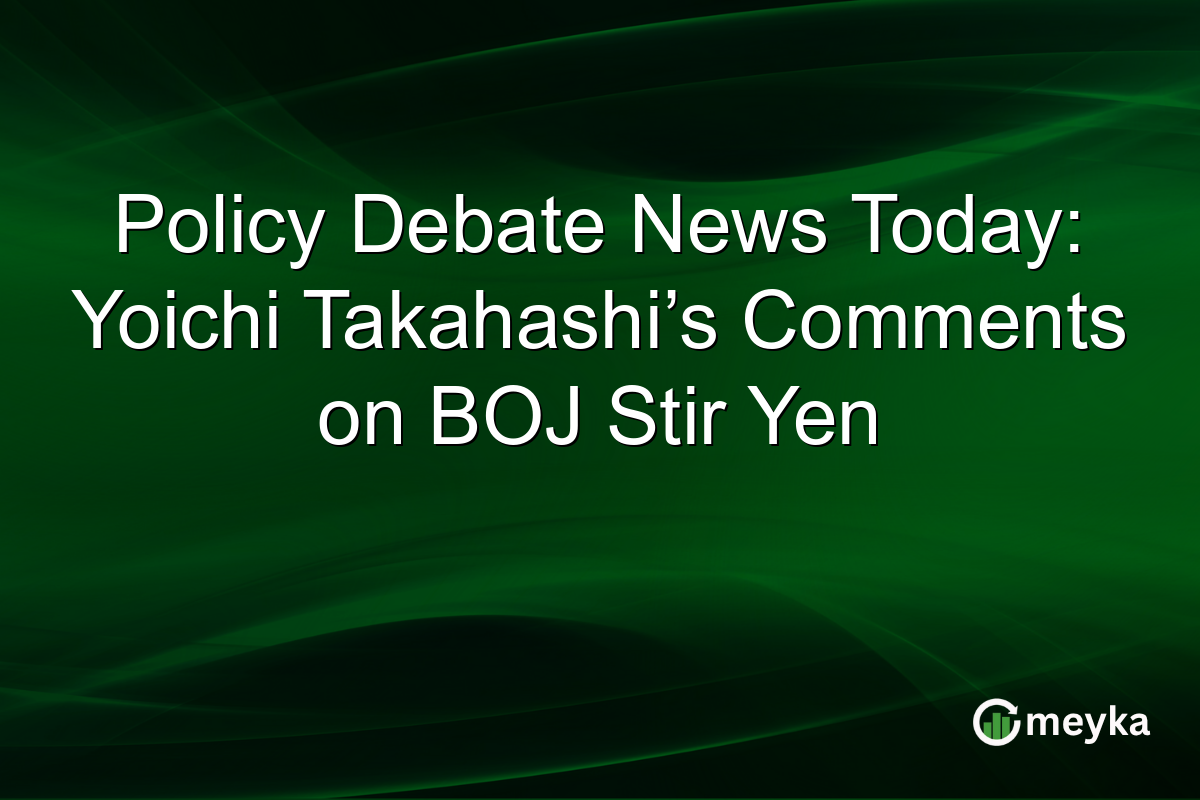Policy Debate News Today: Yoichi Takahashi’s Comments on BOJ Stir Yen
Yoichi Takahashi, a notable Japanese economist and former government adviser, recently sparked discussions with critical remarks on the Bank of Japan’s (BOJ) monetary policy. His comments come at a pivotal moment as inflation rises and yen volatility increases. Takahashi’s insights suggest a need for a revised approach by the BOJ to enhance market stability and control currency fluctuations. With global eyes on Japan’s economic stance, his views are resonating strongly across investors and policymakers.
Yoichi Takahashi’s Critique of BOJ Monetary Policy
Yoichi Takahashi’s criticism centers on the current BOJ monetary policy, which he believes is inadequate in addressing the yen’s recent volatility and rising inflation rates. He argues that the BOJ should consider tightening its policy to stabilize the yen and control inflation effectively. This recommendation underscores concerns that the BOJ’s approach might be too passive during economic fluctuations, risking further instability. His comments draw attention at a crucial time when Japan grapples with inflation hovering between 3% and 4% this year. This aligns with market concerns about the BOJ’s strategies, as investors closely monitor any hint of policy change that might impact financial markets. As the yen experiences frequent shifts, Takahashi’s proposals resonate with many who advocate for more proactive measures from the BOJ. For more insights, visit Bloomberg article.
BOJ’s Current Stance and Market Reactions
Despite the pressures for policy adjustments, the BOJ has maintained its low-interest-rate environment aimed at supporting economic growth. However, market reactions indicate a growing impatience for change, reflected in recent yen depreciation trends. Critics argue that the BOJ’s delay in policy shifts limits Japan’s competitiveness on the global stage. The market’s response is cautious, with investors anticipating potential adjustments. The yen’s fluctuations demonstrate the market’s sensitivity to monetary policy news. Experts believe that any significant policy revision by the BOJ could boost investor confidence, stabilizing the yen and reducing volatility. For more details, see Reuters article.
The Japanese Inflation Outlook and Future Implications
Japan’s rising inflation adds pressure on the BOJ to reevaluate its strategies. With inflation rates prompting concerns over purchasing power, there’s urgency in balancing inflation control with economic growth. Takahashi’s comments on BOJ monetary policy suggest that the institution must prioritize yen stabilization to sustain consumer confidence. Looking ahead, if the BOJ aligns with Takahashi’s advice, we may see more aggressive measures to curb inflation and stabilize the currency. Such strategic shifts could significantly impact Japan’s economy and its international trade dynamics. More analysis is available at CNBC article.
Final Thoughts
Yoichi Takahashi’s comments on BOJ monetary policy have highlighted significant concerns amid yen volatility and rising inflation. His call for policy shifts resonates within economic circles, emphasizing the need for strategic adjustments to ensure market stability. As Japan navigates these pressures, the BOJ’s responses will be closely watched by investors and global markets alike. Aligning monetary policy with current economic realities could bolster the yen and instill greater confidence among market participants, ultimately supporting Japan’s growth trajectory.
FAQs
Yoichi Takahashi criticized the Bank of Japan’s current monetary policy, suggesting a need for tighter measures to stabilize the yen and control inflation.
Changes in BOJ policy could stabilize the yen by reducing its volatility, thus increasing investor confidence in Japanese markets overall. This could also help control inflation.
Japan’s inflation has been between 3% and 4% this year, raising concerns about the current monetary policy’s effectiveness in managing economic stability.
Disclaimer:
This is for information only, not financial advice. Always do your research.






